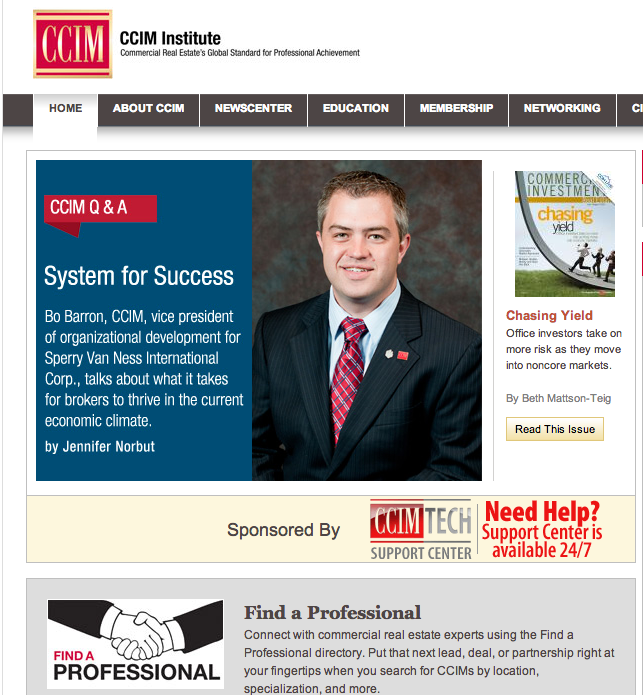The Clarity Series is a series of posts all on one subject. This particular subject is prospecting. While the context is commercial real estate, these steps and principles can be applied to any sales. To read the introduction of this series, click here. To read an overview of the entire prospecting system, click here. Thank you for reading!

photo from iStockPhoto
In 2010, I bought the family commercial real estate brokerage business from my dad. That week, I had 3 closings. It was great timing. All of them were Single Tenant Net Lease (STNL) deals. I experienced in a new way broker’s remorse.
Broker’s remorse is that feeling of exuberance a broker feels once a good size deal closes. It is followed 5 minutes later by the feeling of, “Oh crap! What next?” In commission sales, it is like you are unemployed between closings. After those deals closed, I looked at my pipeline and panicked.
I had nothing else happening. I had zero clue when my deal would hit. I had not been prospecting and I was paying for it. I also had an epiphany.
The only deals that were getting done were STNL deals. Until that day, I was a generalist. On that day, I chose my specialty. I prospected on 405 Dollar stores in the commonwealth of Kentucky.
Question: What is your specialty? (If you paused or couldn’t articulate it in 20 words or less, then you don’t have a specialty.)
Top producers in commercial real estate are specialists. This is known and proven. So, when you are crafting a prospecting system, you must start with these two steps: geography and specialty.
Geography
Now remember – when you are prospecting, you are asking for the business. Your geography is simply the physical area where you will be doing so. Let me give you some examples:
- A STNL specialist who prospects nationwide.
- A multifamily specialist who prospects within a 20 mile radius of a certain city.
- An industrial specialist who works a specific industrial area within a city.
- A tenant rep who serves her client wherever they go
- An advisor who specializes in a certain, defined neighborhood.
In my case, my geography was the commonwealth of Kentucky. I had to go that wide to have enough inventory of Dollar Stores. Ideally, you want a minimum of 400 properties to call upon in your chosen geography.
Specialty
You can be a geographical specialist. The number one broker of the number one CRE firm (by number of transactions) in New York City is Bob Knakal. Bob is a geographical specialist. He can show you on a map which blocks in the city he works. In fact, his entire office is set up this way. Each broker has their own territory. They know everything about every property within that territory. Or they get to go work somewhere else.
I was in Chicago last week training some brokers in our office there. It is a top 3 office in our company. One of their top 3 guys was explaining to me all the success he has had since he specialized. And his specialty is a specific neighborhood. He owns property in that neighborhood. He is a peer with the owners he is calling on. You can’t go 2 blocks without seeing one of his signs.
More common, however, is a product type specialist. You can go with the major food groups – multifamily, retail, office, and industrial. Or, you can go more of the niche route and focus on STNL, medical office, sale-leasebacks, self-storage, and on and on. I know a great broker who specializes in marines. Another who does charter schools.
The key to remember is that you know what you are, and you know where you pursue deals.
To make this decision, ask yourself the following 3 questions:
- What kind of deals do I like? Or what kind of properties do I like? – Different product types have certain characteristics that you may or may not like. For instance, I don’t like industrial properties. They don’t fit my eye. I don’t like being in industrial parks. It would not be a good idea for me to pick this as a specialty.
- What are you good at? Do you have more experience in one product type or another? You may love multifamily. You may also hate numbers and underwriting. If that is the case, you may be more suited for something simple like STNL. Know what you are good at!
- Where is the transactional velocity? You may love marinas. You may be great at those kinds of deals. But if you are intent on working Nebraska…see my point?
If you can find a specialty where the answers to these three questions intersect, then you may have found your sweet spot. Once you have this, the next step is to gain encyclopedic knowledge of your specialty. That will be the focus of the next post.
Until then, I challenge you to state your specialty publicly in the comments section. I will ask you again. What is your specialty?
There was an issue loading your timed LeadBox™. Please check plugin settings.






















